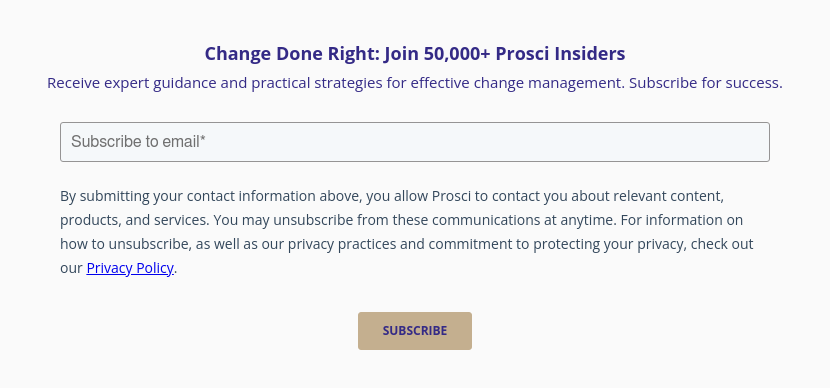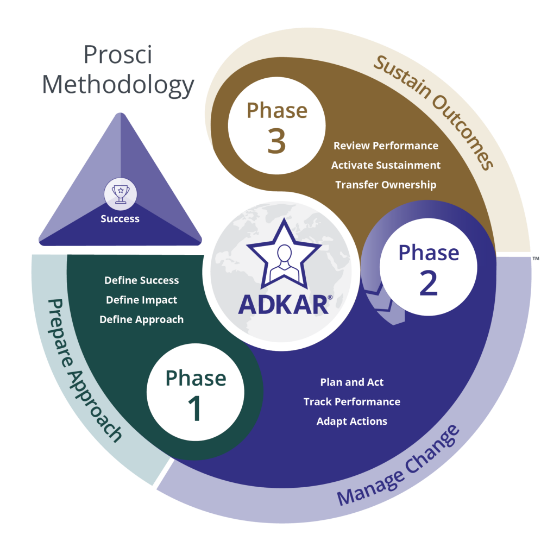How to Weave Change Capabilities Into Your Work

4 Mins
Updated: July 25, 2024
Published: September 20, 2023

How do organizations improve in change management? How can you get people to engage more with change management? Every organization is unique, with different levels of change management maturity, influence and control. No matter your circumstances, there are things you can be doing right now to build change management capability and grow your maturity in change management over time.
Constraints to Building Change Capability
If you struggle to build change capability, you’re not alone. We have spoken with many change practitioners and leaders who want to grow change capability but feel they can’t. Common reasons we hear include:
- “I don’t have enough time.”
- “I don’t know where to start.”
- “I don’t have the authority or a formal mandate.”
- “My organization is not ready.”
- “I don’t have the budget or resources.”
- “We only work on specific projects.”
These constraints do create barriers to building change capability. But if you try to reframe the issue and think about where you do have more control, you’ll find you can build change capability through ordinary activities. How can you execute your everyday work in a way that helps you build more sponsorship for change management, more support and commitment for change management, or more funding and resources for change management?
No matter where your starting point is, you can optimize your everyday work to build in more change management capability.

Areas of Change Capability
When you decide to build change management capabilities, the actions you take will focus on five specific capability areas: Leadership, Application, Competencies, Standardization and Socialization.
Leadership capability
Do you have strong, widespread support for change management? This capability is about senior leadership support for building change management capability, and it involves having a dedicated sponsor with a long-term vision, and dedicated funding and resources for building change capability. Key leaders have also communicated change management’s importance to the organization.
What are you already doing in your everyday work?
You already create and execute communications for change management efforts.
What are some things within your control that you can do to build capability?
One way to build Leadership capability is to write the communications for your sponsor to send. Another way is creating and presenting to leaders the need for change management and the strategy to build change management, which is a project within itself.
Application capability
Is change management being applied to projects and initiatives with rigor? With this capability, projects across the organization are applying a structured approach for change management using a consistent methodology and tools. Practitioners and funding are also available to apply them on organizational projects and initiatives.
What are you already doing in your everyday work?
You already complete an impact assessment for project changes.
What are some things within your control that you can do to build capability?
Starting with applying the activities and assessments from Phase 1 – Prepare Approach of the Prosci 3-Phase Process can give you solid footing to build a strategy and articulate change plans. To continue building this capability in your team, complete the 10 Aspects of Change Impact together, talking through the individual and group impacts with enough detail that they eventually learn how to do them without you.
Prosci 3-Phase Process
.png?width=700&height=497&name=3-phase-process-with-plain-language-questions%20(1).png)
Competencies capability
Do people have the skills they need to play their role in change? For this capability, change practitioners are trained and engage in continuous education. People managers and senior leaders are trained to execute their unique roles during change and can demonstrate the ability to support the change effectively. Skill‐building for navigating change is also embedded in the organization.
What are you already doing in your everyday work?
For example, your role requires you to prepare people managers for specific project changes in your organization.
What are some things within your control that you can do to build capability?
To build competencies in resistance management, look for opportunities to equip people managers for their resistance manager role by sharing your favorite tactics for managing resistance, and giving them an opportunity to share and hear from their peers. Also, remember to meet people where they are and build from there. Reflect on your efforts as you find ways to continuously improve.
Standardization capability
Do standard triggers, approaches and roles for change management exist? Building this capability area includes having and adopting a standard methodology, as well as having change management‐specific functions, job roles and networks in place. Change management is integrated with a standard project delivery process, and it is triggered in other “change initiating” processes and systems.
What are you already doing in your everyday work?
For example, you may already apply the Prosci Methodology or another structured approach in your change management work.
What are some things within your control that you can do to build capability?
When you have a charter for a process improvement, or other project, in the organization, you can weave in the Particulars (what’s changing) and the People aspects from the 4P’s (Project name, Purpose, Particulars and People), so it becomes an expected part of a project charter. You can lead by example where the results of your following the Prosci 3-Phase Process represents the optimal way for all projects moving toward setting a standard and expectation.

Socialization capability
Is change management something most of the organization understands, appreciates and asks for?
Socialization capability is about having a shared definition of change management in the organization, and a shared understanding of its value in achieving organizational outcomes. Change management success stories are captured and shared throughout the organization, and people commonly request a change management plan.
What are you already doing in your everyday work?
For example, you may already attend various meetings with sponsors and people managers in your organization.
What’s one thing within your control that you can do to build capability?
If you build a change management report-out into the start of a meeting you all attend on a regular cadence, leaders will learn about change management projects and successful outcomes. If you do not have access to sponsors, consider building or contributing to a change management community of practice with your peers to share success stories or ask to share them with Leadership.
Build Change Management Capabilities
The work you do on a daily basis offers many opportunities to increase change capability and maturity at your organization. The beauty of this approach is that a little creativity can have a large impact without increasing your workload. Achieving and maintaining success over time will require intention, but once you have a simple plan in place, you can build activities into your daily work and even make capability-building a habit.
.png?width=1200&height=628&name=CTA-Blog-Downloadable%20worksheet-v3%20(1).png)


